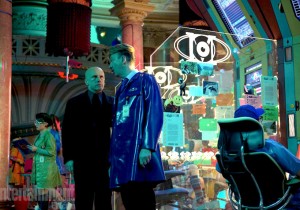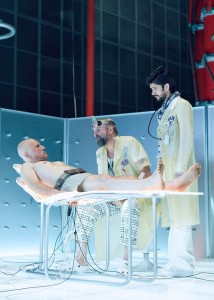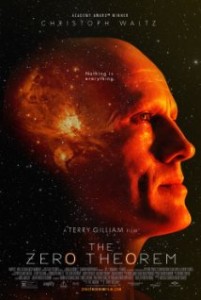This film belongs to the new business paradigm: it’s now available for instant home viewing, but we have to wait till September 19th for its arrival on U.S. movie screens. I don’t get it either.
Terry Gilliam’s latest cinematic dystopia probably contains the best-articulated philosophical statement of any movie I’ve seen this year. Staying securely in spoiler-free territory, it can be summed up thusly: on a universal scale, our lives lack any significance; and time spent seeking a divinely ordained mission equals time squandered, when we could more fruitfully pursue happiness by loving the person directly in front of us. (Sigmund Freud famously – and allegedly – asserted that we attain maturity in life through work and love, but only the latter option is available in Gilliam’s frenetic hypercapitalist nightmare, where the slogan is, “Don’t ask – multitask!”)
The Zero Theorem begins with a shot of a swirling black hole sucking all matter into its merciless maw. Only as the camera slowly pulls back and rotates, do we realize that our naked protagonist Qohen Leth (a completely shorn and subdued Christoph Waltz) is staring at this galactic portrait on his computer screen.
Qohen is repeatedly haunted by this image, which is held in tense opposition to his god delusion. Ever since an anonymous aborted phone call (most likely from a salesperson), he has waited obsessively for the Second Calling, when his unique purpose will be manifest. At that first call, Qohen felt “a rush of joy, power,” and now he eagerly longs for the next, consummating fix. In the meantime, he lives blandly and reclusively in a burnt out monastery, surrounded by weathered images of saints and an overhanging crucifix from which the head of Jesus has been removed and replaced by a video camera.
On the job, Qohen miserably plugs away as an “entity cruncher” for the megacorporation Mancom. When the head honcho, the impersonally named Management (a creepy Matt Damon), proposes that Qohen stay home and work exclusively on the “Zero Theorem,” in exchange for a promise to make his phone call happen, our hero leaps at the opportunity. (The Zero Theorem, Mancom’s all-important effort to prove that everything equals nothing, is of course a thinly disguised statement of cosmic nihilism.)

Qohen is aided in his Sisyphean task by his jovial boss Joby (David Thewlis), wannabe lover Bainsley (Melanie Thierry), teen techno-whiz Bob (Lucas Hedges, one of the Khaki Scouts in Wes Anderson’s delightful Moonrise Kingdom), and a ditzy psychotherapy program (Tilda Swinton, channeling Emma Thompson’s Professor Trelawney). By way of occasional hints and cues, however, we and Qohen are left to wonder whether these folks are true friends or malign pawns of Management.

Looking at the world outside his door, it’s hard to fault Qohen for his purpose-driven compulsion. Director Terry Gilliam succeeds in taking Western society’s foibles and making them simultaneously recognizable and horrifying. Our crazy mélange of technology, porn on demand, fanatic religiosity, and overcommercialization has been ramped up on steroid megadoses. Safe sex can now be experienced in a virtual locale of one’s choosing by way of “tantric biometric interfacing,” and every possible space is coated with loud, mobile, gaudy advertisements. Many of these ads promote insanely personalized religions, whether the Church of Batman the Redeemer or (in one of the movie’s funniest moments) “the Church of Intelligent Design, reach[ing] out to the special you.”
While I consider The Zero Theorem’s satirizing and moralizing to be spot on, a handful of flaws keep this film in “good, but not great” territory. First, its sights and sounds have shown up before in similar forms. The intrusively pervasive commercialization recalls Minority Report; the silence of Qohen’s inner sanctum contrasted with the raucous outer world is heavily reminiscent of Peter Sellers’ posh enclosure in the 1980’s classic Being There; and the intense colors of Qohen and Bainsley’s fantasy sex island resemble the garish hells of Kurosawa’s Ran and Dodes’ka-den. Even more disappointingly, the monstrous apparatuses, freakish medical devices, and cavernous interiors could’ve been lifted from Gilliam’s own previous work, Brazil and 12 Monkeys.

Second, the cartoonish exaggeration of nearly everything – set design, attire, gestures, and emotions – fell flat at times and emotionally detached me from a hefty chunk of the movie. (If I were Emperor of the Multiplex, I would decree that the Coen Brothers and Wes Anderson have sole claim on cinematic tics and affectations. Just about everyone else blows it.)
Lastly, the rapid-fire verbiage and sensory overload that occupy much of The Zero Theorem result in a semi-unpleasant viewing experience. After the movie was over, I simply craved a hike and some technology-free quiet time with the people I love. Then again, Terry Gilliam is probably aiming for that exact response.
3.5 out of 5 stars
(The Zero Theorem is rated R for language, sexuality, and nudity. I consider it suitable for mid-teens and older.)













